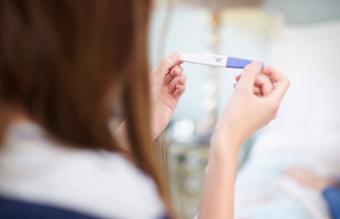
When you're trying for a baby, conception problems can be heartbreaking. Some of these problems are easily treated, but others are difficult to overcome.
Timing Is Key
A woman has only a few days each month when she can conceive. One of the simplest ways to increase the chance of getting pregnant is to have sex during those days. You can learn more about predicting fertile days in LoveToKnow's Tips on Getting Pregnant.
With regular intercourse and no medical problems, most couples can expect to become pregnant within a year.
Reasons for Conception Problems
There are many reasons why a woman might have trouble conceiving. They include hormonal imbalances, problems with the reproductive system, and genetic problems.
Problems with the Reproductive System
If a woman's ovaries, fallopian tubes, and/or uterus are not functioning properly, conception problems can be the result. Hormonal problems can also interfere with conception.
- Ovaries. Ovaries contain a woman's eggs, releasing one each month. They also make hormones that are important to the reproductive cycle. Ovaries can be affected by premature ovarian failure, which is similar to early menopause. A disease called polycystic ovary syndrome (PCOS) can cause ovaries to release eggs irregularly, or to release eggs that are not viable.
- Fallopian tubes. Fallopian tubes carry eggs from the ovaries to the uterus. Tubes can be blocked due to infection, disease, or injury. Pelvic inflammatory disease, a complication of a sexually transmitted infection, can scar tubes. Endometriosis, a problem in which abnormal tissue forms, can cause blockage.
- Uterus. The uterus contains the developing baby. Benign tumors, called fibroids, can form in or on the uterine wall, interfering with implantation of an egg. Problems with the uterine wall itself can also prevent implantation. Rarely, a woman is born without a uterus. It's also possible to have an abnormally formed uterus.
- Hormones. An elegant hormonal cascade controls a woman's reproductive cycle. The ovaries, adrenal glands, hypothalamus, pituitary gland, and thyroid gland all contribute to fertility. A breakdown anywhere in the system can cause conception problems.
Genetic Problems
Doctors think that many pregnancies end in miscarriage before the woman even knows she's pregnant. The primary reason for these early miscarriages seems to be genetic problems. After a sperm fertilizes an egg, a very complicated developmental process begins. If there's a problem with the genetic material in the fertilized egg so that it can't develop into a baby, miscarriage is usually the result.
Genetic problems can originate with either the mother or the father. Often, they're random; even if one pregnancy doesn't succeed, the next turns out just fine. Occasionally, however, one or both parents carries a genetic mutation that causes repeated miscarriages. A doctor can help you figure out if this is happening to you.
Male Fertility
A medical workup for conception problems should include a full examination of the male partner. Some men don't make enough sperm, so it's less likely that a sperm and egg will connect. A low sperm count can be due to enlarged veins in the scrotum, which make the scrotum too warm for sperm to develop properly. This problem is called "varicocele."
Other men have plenty of sperm, but they don't work right. Normal sperm have mobile tails that allow them to "swim" up into a woman's uterus and fallopian tubes, where fertilization can happen. But some men have sperm that can't swim, or that have poorly formed tails. Men can have hormonal imbalances and disease-related fertility problems, too.
Other Reasons
Many other conditions and lifestyle choices can interfere with fertility, including:
- Age. On average, a woman's chance of conceiving declines with age.
- Weight. Being significantly overweight or underweight can interfere with conception. Women who have very low body fat may actually stop ovulating.
- Smoking, drugs, and alcohol. These can all reduce your chance of getting pregnant.
- Medication. Some medications interfere with the balance of hormones, or otherwise decrease fertility.
- Chronic illness. Some illnesses can interfere with reproductive ability.
Tracking Down the Problem
The first step, if you're having conception problems, it to pay a visit to your doctor. Questions the doctor should ask include:
- How long you've been trying
- How often you're having intercourse
- If you've had any sexually transmitted diseases that could affect your fertility
- What medications you're taking
A woman should also be asked:
- If her periods are regular
- If she's ever been pregnant and if so, if she already has any children
You can expect the doctor to do a full physical exam. Lab tests will reveal important hormone levels. The doctor will probably also want a work-up on your partner, because it's possible for both of you to have problems contributing to infertility.
Treatment
Treatment depends on the cause. Medication can help with many hormonal problems. Knowing about a genetic problem can help you decide whether to keep trying to conceive. When other treatments fail, assisted reproductive technologies, including in vitro fertilization, may be the answer.







